| Listing 1 - 10 of 11 | << page >> |
Sort by
|
Periodical
Abstract | Keywords | Export | Availability | Bookmark
 Loading...
Loading...Choose an application
- Reference Manager
- EndNote
- RefWorks (Direct export to RefWorks)
Birmingham (Ala.) --- Economic conditions --- Business, Economy and Management --- General and Others --- Business enterprises --- Commerce --- Business organizations --- Businesses --- Companies --- Enterprises --- Firms --- Organizations, Business --- Economic history. --- Alabama --- Business --- History, Economic --- Economics --- City of Birmingham (Ala.)
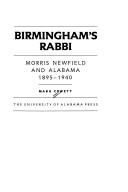
ISBN: 0817382712 9780817382711 9780817350031 0817302840 9780817302849 0817350039 Year: 1986 Publisher: University, Ala. University of Alabama Press
Abstract | Keywords | Export | Availability | Bookmark
 Loading...
Loading...Choose an application
- Reference Manager
- EndNote
- RefWorks (Direct export to RefWorks)
American Jewish history has been criticized for its parochial nature because it has consisted largely of chronicles of American Jewish life and has often failed to explore the relationship between Jews and other ethnic groups in America. Rabbi Morris Newfield led Temple Emanu-El in Birmingham from 1895-1940 and was counted among the most influential religious and social leaders of that city. Cowett chronicles Newfield's career and uses it as a vehicle to explore the nature of ethnic leadership in America. In doing so he explores the conflicts with which Newfield stru
Jews --- Rabbis --- Hebrews --- Israelites --- Jewish people --- Jewry --- Judaic people --- Judaists --- Ethnology --- Religious adherents --- Semites --- Judaism --- Jewish rabbis --- Clergy --- Jewish scholars --- Politics and government. --- Biography. --- Functionaries --- Newfield, Morris, --- Neufeld, Mor, --- Birmingham (Ala.) --- City of Birmingham (Ala.) --- Ethnic relations.
Book
ISBN: 0817380418 9780817380410 9780817316235 Year: 2008 Publisher: Tuscaloosa University of Alabama Press
Abstract | Keywords | Export | Availability | Bookmark
 Loading...
Loading...Choose an application
- Reference Manager
- EndNote
- RefWorks (Direct export to RefWorks)
On a sultry September morning in 1955, a young African American man, the son of share corppers, boarded a Greyhound bus in Birmingham, Alabama, to leave his home state for the first time in his life. He was headed for the University of Detroit on a teaching scholarship from Miles College. Richard Arrington could not have guessed then that his future as a teacher would be postponed for decades by big-city politics--and that he would serve a record-setting five terms as chief executive of Alabama's largest city. Under Arrington's leadership, Birmingham rebuilt itself from a foundering, steel-
Mayors --- African American mayors --- Alcaldes --- Municipal officials and employees --- Corregidors --- Afro-American mayors --- Mayors, African American --- Negro mayors --- Arrington, Richard. --- Birmingham (Ala.) --- City of Birmingham (Ala.) --- Economic conditions. --- Social conditions. --- Politics and government.
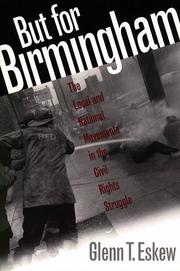
ISBN: 0807861324 9780807861325 9780807823637 0807823635 9780807846674 0807846678 0807823635 0807846678 9798890865045 Year: 1997 Publisher: Chapel Hill : University of North Carolina Press,
Abstract | Keywords | Export | Availability | Bookmark
 Loading...
Loading...Choose an application
- Reference Manager
- EndNote
- RefWorks (Direct export to RefWorks)
African Americans --- Civil rights movements --- Afro-Americans --- Black Americans --- Colored people (United States) --- Negroes --- Africans --- Ethnology --- Blacks --- Civil liberation movements --- Liberation movements (Civil rights) --- Protest movements (Civil rights) --- Human rights movements --- Civil rights --- History --- Birmingham (Ala.) --- City of Birmingham (Ala.) --- Race relations. --- #KVHA:American Studies --- #KVHA:Geschiedenis; Verenigde Staten --- #KVHA:Mensenrechten --- Black people
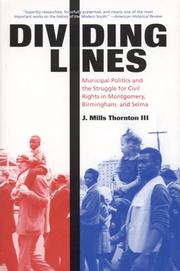
ISBN: 0817380981 9780817380984 9780817352998 0817352996 9780817311704 081731170X Year: 2002 Publisher: Tuscaloosa University of Alabama Press
Abstract | Keywords | Export | Availability | Bookmark
 Loading...
Loading...Choose an application
- Reference Manager
- EndNote
- RefWorks (Direct export to RefWorks)
With this bold offering from two decades of research, J. Mills Thornton III presents the story of the civil rights movement from the perspective of community-municipal history at the grassroots level. Thornton demonstrates that the movement had powerful local sources in its three birth cities-Montgomery, Birmingham, and Selma. There, the arcane mechanisms of state and city governance and the missteps of municipal politicians and civic leaders-independent of emerging national trends in racial mores-led to the great swell of energy for change that became the civil rights movement. <
Political culture --- African Americans --- Civil rights movements --- Culture --- Political science --- Afro-Americans --- Black Americans --- Colored people (United States) --- Negroes --- Africans --- Ethnology --- Blacks --- Civil liberation movements --- Liberation movements (Civil rights) --- Protest movements (Civil rights) --- Human rights movements --- History --- Civil rights --- Selma (Ala.) --- Birmingham (Ala.) --- Montgomery (Ala.) --- City of Montgomery (Ala.) --- City of Birmingham (Ala.) --- Politics and government --- Black people
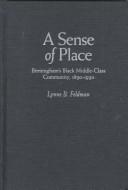
ISBN: 0585280150 9780585280158 0817309675 0817309691 9780817309671 9780817309695 Year: 1999 Publisher: [Place of publication not identified] University of Alabama Press
Abstract | Keywords | Export | Availability | Bookmark
 Loading...
Loading...Choose an application
- Reference Manager
- EndNote
- RefWorks (Direct export to RefWorks)
African Americans --- Middle class --- Regions & Countries - Americas --- History & Archaeology --- United States Local History --- Bourgeoisie --- Commons (Social order) --- Middle classes --- Social classes --- Afro-Americans --- Black Americans --- Colored people (United States) --- Negroes --- Africans --- Ethnology --- Blacks --- History --- Social conditions --- Black people --- Birmingham (Ala.) --- History. --- City of Birmingham (Ala.)
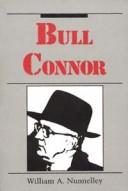
ISBN: 058532316X 9780585323169 0817304959 9780817304959 Year: 1991 Publisher: Tuscaloosa University of Alabama Press
Abstract | Keywords | Export | Availability | Bookmark
 Loading...
Loading...Choose an application
- Reference Manager
- EndNote
- RefWorks (Direct export to RefWorks)
Civil rights demonstrations --- Civil rights movements --- Regions & Countries - Americas --- History & Archaeology --- United States Local History --- Civil liberation movements --- Liberation movements (Civil rights) --- Protest movements (Civil rights) --- Human rights movements --- Freedom marches (Civil rights) --- Sit-ins (Civil rights) --- Demonstrations --- History --- Connor, Eugene, --- Connor, Bull, --- Connor, Theophilus Eugene, --- Connor, T. Eugene --- Connor, Eugene T. --- Birmingham (Ala.) --- City of Birmingham (Ala.) --- Officials and employees --- Race relations.
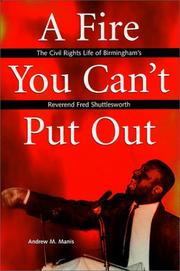
ISBN: 0817313451 0585354405 9780585354408 0817309683 9780817309688 9780817313456 9780817311568 0817311564 Year: 1999 Publisher: Tuscaloosa University of Alabama Press
Abstract | Keywords | Export | Availability | Bookmark
 Loading...
Loading...Choose an application
- Reference Manager
- EndNote
- RefWorks (Direct export to RefWorks)
This first biography of Fred Shuttlesworth-winner of both the 2000 Lillian Smith Award and the 2001 James F. Sulzby Jr. Award-details the fascinating life of the controversial preacher who led integration efforts in Birmingham with the courage and fervor of a religious crusader. When Fred Shuttlesworth suffered only a bump on the head in the 1956 bombing of his home, members of his church called it a miracle. Shuttlesworth took it as a sign that God would protect him on the mission that had made him a target that night. Standing in front of his demolished home, Shu
Civil rights workers --- African Americans --- Civil rights movements --- Civil rights activists --- Race relations reformers --- Social reformers --- Afro-Americans --- Black Americans --- Colored people (United States) --- Negroes --- Africans --- Ethnology --- Blacks --- Civil liberation movements --- Liberation movements (Civil rights) --- Protest movements (Civil rights) --- Human rights movements --- Civil rights --- History --- Shuttlesworth, Fred L., --- Birmingham (Ala.) --- City of Birmingham (Ala.) --- Race relations. --- Robinson, Freddie Lee, --- Black people
Book
ISBN: 0817388923 9780817388928 0817358374 9780817358372 Year: 2015 Publisher: Tuscaloosa
Abstract | Keywords | Export | Availability | Bookmark
 Loading...
Loading...Choose an application
- Reference Manager
- EndNote
- RefWorks (Direct export to RefWorks)
Public welfare --- Benevolent institutions --- Poor relief --- Public assistance --- Public charities --- Public relief --- Public welfare reform --- Relief (Aid) --- Social welfare --- Welfare (Public assistance) --- Welfare reform --- Human services --- Social service --- History. --- Government policy --- Birmingham (Ala.) --- City of Birmingham (Ala.) --- Race relations --- Social conditions.
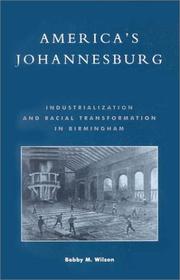
ISBN: 082035628X 084769481X 0820356271 9780820356280 9780820356273 Year: 2019 Publisher: Athens, Georgia
Abstract | Keywords | Export | Availability | Bookmark
 Loading...
Loading...Choose an application
- Reference Manager
- EndNote
- RefWorks (Direct export to RefWorks)
"In some ways, no American city symbolizes the black struggle for civil rights more than Birmingham, Alabama. During the 1950s and 1960s, Birmingham gained national and international attention as a center of activity and unrest during the civil rights movement. Racially motivated bombings of the houses of black families who moved into new neighborhoods or who were politically active during this era were so prevalent that Birmingham earned the nickname "Bombingham." In this critical analysis of why Birmingham became such a national flashpoint, Bobby M. Wilson argues that Alabama's path to industrialism differed significantly from that of states in the North and Midwest. True to its antebellum roots, no other industrial city in the United States depended as much on the exploitation of black labor so early in its urban development as Birmingham. A persuasive exploration of the links between Alabama's slaveholding order and the subsequent industrialization of the state, America's Johannesburg demonstrates that arguments based on classical economics fail to take into account the ways in which racial issues influenced the rise of industrial capitalism"--
Capitalism --- Industrialization --- African Americans --- Afro-Americans --- Black Americans --- Colored people (United States) --- Negroes --- Africans --- Ethnology --- Blacks --- Market economy --- Economics --- Profit --- Capital --- Industrial development --- Economic development --- Economic policy --- Deindustrialization --- Social aspects --- History. --- Economic conditions. --- Social conditions. --- Birmingham (Ala.) --- City of Birmingham (Ala.) --- Race relations. --- Black people
| Listing 1 - 10 of 11 | << page >> |
Sort by
|

 Search
Search Feedback
Feedback About UniCat
About UniCat  Help
Help News
News